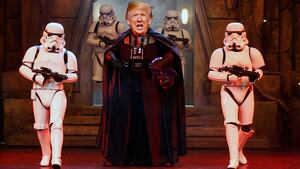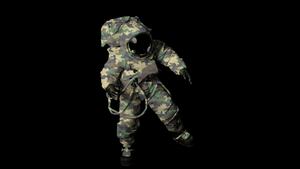If former astronaut Mark Kelly wins the race for the late John McCain's Arizona senate seat in 2020, he could change how we prioritize space exploration, and he could also change how we think about environmental policies here on Earth.
Kelly could help to nudge U.S. space policy away from Donald Trump's “space force” and back toward sound climate science — and Mars.
“We've seen this retreat from science and data and facts,” Kelly says in a video announcing his campaign launch. “If we don't take these issues seriously, we can't solve these problems.”
Kelly, 54, is married to former Arizona congresswoman Gabrielle Giffords, who was shot during a constituent meeting in Tucson in 2011. As a U.S. Navy bomber pilot, Kelly flew 39 combat missions over Iraq and Kuwait during Operation Desert Storm in 1991.
Kelly and Giffords both are Democrats.
Along with his twin brother Scott, Mark Kelly joined NASA's astronaut program in 1996. He flew four missions on the Space Shuttle, two as commander, before retiring in 2011. Today he runs World View Enterprises, a small company that carries experiments into the upper atmosphere aboard balloons.
Kelly is running to complete the last two years of McCain's six-year term that began in 2016; McCain died of brain cancer in September 2018. Arizona governor Doug Ducey appointed Martha McSally temporarily to fill McCain's seat.
Ducey and McSally are Republicans, like McCain was. Arizona's other senator, Democrat Kyrsten Sinema, beat McSally in November to become the state's first woman senator.
If Kelly wins, he'll become the latest in a long line of astronaut-politicians, joining John Glenn and Harrison Schmitt were U.S. senators.. If Kelly won, he could serve on committees overseeing space and science policy.
In interviews he has recalled the shock of observing, from space, humanity's impact on Earth.
“Perhaps the thing that worries me the most is the massive deforestation underway in areas like Asia and Latin America,” Kelly wrote in a 2017 op-ed. “Countless trees and millions of square miles of jungle and forest have been removed to accommodate our desires for more — more wood, more farmland, more pasture, more meat.”
“When I first looked down upon the Amazon rainforest in 2001, I saw vast areas of jungle and a wide and winding copper colored river that went on and on and on,” Kelly continued. “A river that was impossible to miss and like no other on the planet. By 2011, however, the part that was most noticeable wasn't the river or the jungle but the large swaths of empty land.”
NASA has weathered Trump's attacks on science better than other agencies. Congress overrode the administration's back-to-back attempts to cancel a NASA satellite program for monitoring atmospheric carbon.
Trump's cabinet members stripped all mentions of climate change from the websites of most of the agencies under their purview, but NASA has maintained its climate sites. And NASA scientists even succeeded in changing the mind of their new administrator Jim Bridenstine, a former climate-change denier.
“I heard a lot of experts, and I read a lot," Bridenstine said shortly after his confirmation to lead NASA. “I came to the conclusion myself that carbon dioxide is a greenhouse gas, that we've put a lot of it into the atmosphere, and therefore we have contributed to the global warming that we've seen.”
Kelly opposes the Trump administration's bewildering efforts to create a separate military branch for space, an idea Trump apparently came up with on the fly during a campaign rally.
“This is a dumb idea," Kelly tweeted. “The Air Force does this already. That is their job. What's next, we move submarines to the seventh branch and call it the 'under-the-sea force?’”
Kelly likewise questioned the administration's obsession with the moon. Under former President Barack Obama, NASA had begun the long-term planning for an eventual manned mission to Mars. Under Trump, however, NASA has abruptly changed course, abandoning Mars in favor of the moon.
In the summer of 2018, the space agency began the bidding process for a new lunar space station that could be habitable as early as 2022. The $2.7-billion Lunar Orbital Platform-Gateway could function as a jumping-off point for manned missions to the moon, including to its relatively unexplored far side.
Perhaps not coincidentally, the moon holds valuable minerals that, in theory, could be mined. In early 2017 Trump's space transition team — which included several space entrepreneurs, including Charles Miller of NextGen Space — quizzed NASA on its readiness to mine the lunar surface.
Mars, by contrast, is harder to monetize. But landing astronauts on the Red Planet is a worthier project, Kelly said. “We should just go straight to Mars. Forget about the Moon. We’ve been there. We’ve already done that.”
“For science, the now well-established presence of water and early habitability of Mars offers the chance to help answer a fundamental question: ‘Are we alone?’” Kelly wrote in a 2017 op-ed.
“Finding even extinct Martian life would forever change the way we view ourselves. Second, a national push to go to Mars would require new technologies, goods and services that would yield an enormous return on investment to our economy.”
“History shows us that nations that fail to explore succeed in becoming stagnant,” he concluded. “America must explore.”
If he wins, Kelly would be just one of a hundred votes in the Senate. But his experience and expertise could prove persuasive, especially on committees where consensus still is important.
In his campaign video, Kelly calls for bipartisanship and teamwork. “It's pretty obvious pretty early on when you get into space that we're all in this together.”








